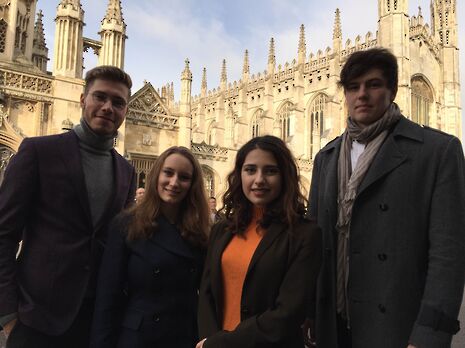Varsity Introducing: LawBot
Anna Jennings meets two of the founding team behind LawBot, the world’s most advanced chatbot lawyer

What is LawBot?
Ludwig Bull (Managing Director): LawBot is a website, a chatbot – it’s an artificially intelligent software program that can help you to understand whether you have been a victim of a crime. Right now we cover most of the criminal offences in England, and you can go to LawBot, explain what happened to you, and LawBot will ask certain questions, and then conclude whether it amounts to a crime.
What inspired you to create this?
LB: We think the world is missing this. There’s a real problem with access to justice as people don’t know what the law is. At the moment you need lawyers as interpreters, because the law is a language people don’t understand. There’s already lots of legal information on the web, but what’s lacking is someone to explain it in non-legal terms. This chatbot bridges that gap.
Rebecca Agliolo (Marketing Director): We try to strike a balance between being concise and incorporating legal knowledge so that it is precise, and also being user-friendly and understandable. We consider LawBot to be a preliminary assessment, so if you’re on the fence about whether to contact a lawyer or not this should help you decide. We are the world’s first criminal law chatbot – there’s nothing like us anywhere.
Is it like speaking to a human?
RA: We worked really hard to make it as little robotic as possible. We have randomised responses, so even if you input the same thing, no two conversations with the bot will be the same. We’ve incorporated sympathy and compassion, so it will say things like “I’m really sorry that happened to you”. We want to make it as user-friendly as possible to help our clients feel comfortable. It’s also completely confidential, secure and non-judgemental, which may make it better in some ways to talk to than a person.
How was it created?
RA: We’re a team of lawyers dipping our toes into technology. We’re all current undergraduate Law students at Cambridge, working on different aspects to bring the bot to life. It’s a real labour of love – we really enjoy doing it.
LB: I do all the coding of the bot itself, and we have someone who’s helping us with designing the website and the interface. I taught myself. It means we can incorporate the legal knowledge very easily, because I’ve got a background in law.
How’s the project gone so far?
RA: At the moment we’re only seven weeks old. We went live two weeks ago, and we’ve been focusing on getting people to interact with it and asking for their feedback.
LB: Currently we’ve had around 14,000 bot interactions – which consist of one input and one output – and we’ve already had some confirmed cases where people have gone to the police after speaking to the chatbot.
What are your plans for the future?
LB: Right now it deals with English criminal law. We’re already looking to broaden that out to judicial review, human rights, civil cases and other jurisdictions, as the technology is very scalable and transferable. We’d like to expand globally – we’re already in touch with some other universities. We’re never going to do advertising, or any services which are payable. Of course, at some point it may be useful for us to get some money to expand the services which we can provide. We could get money from solicitors who are interested in partnering with us. But the cost would never fall on the user.
Finally, I said ‘hello’ to LawBot
LawBot: Nice to meet you, Varsity. I can help you understand if you have been the victim of a crime. If you don’t understand what I am saying, just say so and I will explain. If you don’t understand a word, just ask me about it and I will give you a definition. Would you like to get started?
You can find out more about LawBot and try it out for yourself at www.lawbot.info, and you can follow @LawBot_UK
 Features / Selling the Cambridge experience: private summer programmes in the historic university 3 August 2025
Features / Selling the Cambridge experience: private summer programmes in the historic university 3 August 2025 News / Newnham postgrads referred to homeless charities as College runs out of rooms31 July 2025
News / Newnham postgrads referred to homeless charities as College runs out of rooms31 July 2025 News / Two arrested after death of Cambridge language school student 4 August 2025
News / Two arrested after death of Cambridge language school student 4 August 2025 News / News in Brief: Bare bikers, business and budding scientists3 August 2025
News / News in Brief: Bare bikers, business and budding scientists3 August 2025 Interviews / A place to Thrive: Cambridge’s all-vegan café and community hub3 August 2025
Interviews / A place to Thrive: Cambridge’s all-vegan café and community hub3 August 2025







